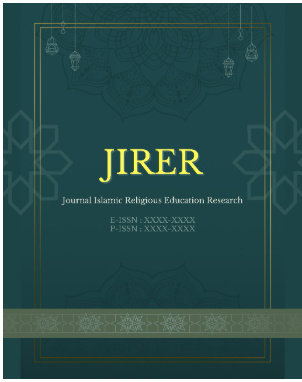Tujuan Pendidikan Islam dalam Perspektif Imam Al-Ghazali: Sebuah Kajian Filsafat Pendidikan
Keywords:
Imam Al-Ghazali, Philosophy of Education, The Goals of Islamic EducationAbstract
The purpose of education occupies a very important position in the realm of education. Without a clear formulation of its objectives, the educational process will lose both direction and meaning. Therefore, determining the goals of education becomes the core of all philosophical reflection, as it embodies the worldview and philosophical foundation of the educational institution itself. The aim of this study is to provide an overview of the essence and direction of Islamic education as explained in Ihya’ ‘Ulumuddin, examined from the perspective of the philosophy of education. This research employs a descriptive qualitative method in the form of a library study. In the context of Islamic education, its main objective is to form individuals who continuously strive to draw closer to Allah by obeying His commands and avoiding His prohibitions. From the philosophical standpoint of education, the orientation toward closeness to Allah aligns with the concepts found in the schools of idealism and essentialism, both of which emphasize spiritual and moral values as the core of education. Furthermore, achieving happiness in this world and the hereafter is also one of the primary goals of education according to Imam al-Ghazali’s view in Ihya’ ‘Ulumuddin. Humans are required to balance worldly and spiritual responsibilities in order to attain true happiness in both realms. This view is consistent with the principles of idealism and essentialism, which stress the balance between intellectual, moral, and spiritual development.
References
Al-Ghazali, I. (2004). Ihya’ Ulumiddin, Terj. Ibnu Ibrahim Ba’adillah (p. 23). p. 23. Mesir: Dar al-Hadits.
Amriyadi, & Wanto, D. (2023). Pendekatan Filsafat Esensialisme Dalam Pemecahan Masalah Pendidikan. Jurnal Tunas Pendidikan, 5(2), 429–438.
Arjuna, A., Ulhaq, M., Ariska, M., Harahap, Y., & Maslani, M. (2025). Utilization of Jumbo animated movie as a medium for moral learning. Jurnal Iman Dan Spiritualitas, 5, 313–324. https://doi.org/10.15575/jis.v5i3.46818
Arjuna, Kurahman, O. T., Rusmana, D., & Maulana, H. (2024). Rekonstruksi Konsep Dasar Ilmu Pendidikan Islam dalam Al-Quran di Tengah Dekadensi Moral Pada Era society 5.0. Al-Liqo: Jurnal Pendidikan Islam, 9(2), 203–223. https://doi.org/https://doi.org/10.46963/alliqo.v9i2.2276
Arjuna, Prilianto, F., Ariska, M., Sukmara, G. F., & Tarsono. (2024). Kecerdasan Emosional Sebagai Katalisator Peningkatan Prestasi Akademik dan Kecakapan Sosial di Era Digital. Jurnal Kependidikan. Desember 2024.No.1 (13) Spesial Issue. Didaktika: Jurnal Kependidikan, 13(001), 761–768. Retrieved from https://mail.jurnaldidaktika.org/contents/article/download/1355/818
Arjuna, Rajasyah, M. A., Prilianto, F., Ningsih, N. W., & Musdalifah. (2024). Tinjauan filosofis pragmatisme jhon dewey terhadap persoalan prokrastinasi mahasiswa. JDK: Jurnal Dakwah Dan Komunikasi, 9(2), 122–129.
Depita, T. (2024). Pemikiran Mahmud Yunus tentang Pendidikan Islam. Jurnal Tawadhu, 8(1), 41–56.
Habibi, E., Nawangsari, D., Zein, H., & Rafiqie, M. (2025). Pemikiran Pendidikan Imam Al Ghazali dalam Kitab Ihya’ Ulumiddin. EDUSHOPIA: Journal of Progressive Pedagogy, 2(1), 92–110.
Hasibuan, U. S., Utami, P. I., Novia, S., & Surahman, C. (2024). Konsep Khalifah dalam Qs . Al-Baqarah / 2 : 30 dan Implikasinya Terhadap Tujuan Pendidikan Islam di Era Society 5 . 0. Journal of Qur’an and Hadith Studies, 13(2), 272–285. https://doi.org/10.15408/quhas.v13i2.42166
Kamila, K. I., Karima, N. M., Azzahra, N. T., & Bakar, M. Y. A. (2024). Aliran Filsafat Esensialisme dalam Pandangan Pendidikan Islam. Jurnal Sains Student Research, 2(6), 246–256.
Nurhasanah, F., Ibnudin, & Syathori, A. (2023). Konsep Pendidikan Menurut Buya Hamka Dan Relevansinya Dengan Pendidikan Islam Kontemporer. Journal Islamic Pedagogia, 3(2), 176–195.
Nursobah, A., Arjuna, Ulhaq, M. M., & Ariska, M. (2025). Integrative Model Of Religious Habituation In Building Students Religious Character. Fitrah: Journal of Islamic Education, 6(2), 310–325. https://doi.org/10.53802/fitrah.v6i2.1142
Rusdi. (2013). Filsafat Idealisme (Implikasinya Dalam Pendidikan). Dinamika Ilmu, 13(2), 236–249.
Saadah, D., & Nurussafaa, A. (2024). Memahami Konsep Pendidikan Agama Islam. Pena Islam Jurnal Pendidikan Agama Islam, 7(1), 48–62.
Said, I. G. (2017). Kitab-Kitab Karya Ulama Pembaharu: Biografi, Pemikiran dan Gerakan. Surabaya: PT. Duta AKSARA MULIA.
Srg, S., & Lbs, F. H. (2024). Harmonisasi Konsep Pendidikan Muhammad Athiyah Al-Abrasi Dan Hadits Makarim Al-Akhlaq Dalam Konteks Pendidikan Islam Modern: Analisis Relevansi Dan Implementasi. Atta’dib Jurnal Pendidikan Agama Islam, 5(1), 88–108.
Suharto, T. (2014). FILSAFAT PENDIDIKAN ISLAM Menguatkan Epistemologi Islam dalam Pendidikan. Yogyakarta: Ar-Ruzz Media.
Suroso, & Sholehuddin, S. (2023). Pemikiran Essensialisme Dalam Filsafat Pendidikan. Gudang Jurnal Multidisiplin Ilmu, 1(6), 78–86.
Suryadi, R. A., & Anwar, S. (2023). Klasifikasi Tujuan Pendidikan Islam. TAKLIM: Jurnal Pendidikan Agama Islam, 21(2), 105–118.
Downloads
Published
Issue
Section
License
Copyright (c) 2025 JIRER JOURNAL ISLAMIC RELIGIOUS EDUCATION RESEARCH

This work is licensed under a Creative Commons Attribution-NonCommercial-ShareAlike 4.0 International License.






